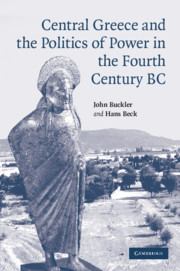Book contents
- Frontmatter
- Contents
- List of maps
- Preface
- Acknowledgments
- List of abbreviations
- Prologue
- Part I ALLIANCE
- Chapter 1 A survey of Theban and Athenian relations between 403–371 BC
- Chapter 2 The incident at Mt. Parnassus, 395 BC
- Chapter 3 The battle of Coronea and its historiographical legacy
- Chapter 4 The King's Peace, alliance, and Phoebidas’ strike (382 BC)
- Chapter 5 Sphodrias' raid and the evolution of the Athenian League
- Part II HEGEMONY
- Part III DOMINATION
- Epilogue
- Glossary
- References
- Index
Chapter 1 - A survey of Theban and Athenian relations between 403–371 BC
from Part I - ALLIANCE
Published online by Cambridge University Press: 22 September 2009
- Frontmatter
- Contents
- List of maps
- Preface
- Acknowledgments
- List of abbreviations
- Prologue
- Part I ALLIANCE
- Chapter 1 A survey of Theban and Athenian relations between 403–371 BC
- Chapter 2 The incident at Mt. Parnassus, 395 BC
- Chapter 3 The battle of Coronea and its historiographical legacy
- Chapter 4 The King's Peace, alliance, and Phoebidas’ strike (382 BC)
- Chapter 5 Sphodrias' raid and the evolution of the Athenian League
- Part II HEGEMONY
- Part III DOMINATION
- Epilogue
- Glossary
- References
- Index
Summary
The end of the Peloponnesian War saw the beginning of animosity between Thebes and Sparta, as so often happens between victorious allies after a bitter war. The first incident occurred after an acrimonious disagreement over the treatment of the defeated. The Thebans, joined by the Corinthians and many other Greeks, demanded the destruction of Athens, which the Spartans refused because of past Athenian services in the defense of Greece. The Thebans further angered the Spartans when they, alone of the allies, demanded a tithe of the spoils of war. The quarrel between the Thebans and Spartans held unexpected results for the Athenians, for the Thebans totally reversed their hostile policy towards Athens. They began by giving refuge to Thrasybulus and his followers after their exile by the Thirty Tyrants. When Thrasybulus seized the Piraeus, the Spartans ordered a campaign to dislodge him, but both the Thebans and Corinthians refused to participate (Xen. Hell. 2, 4, 30; 3, 5, 5). This sudden change of policy was based only on mutual hostility toward Sparta, apart from which Thebes, Corinth, and Athens shared no other joint interests. The Thebans strove to maintain their political hegemony in Boeotia, the Corinthians to win greater independence from Spartan leadership of the Peloponnesian League, and the Athenians to restore their maritime power. For the moment, however, these aspirations were hardly discordant, for success in each area would curtail the power of Sparta, the common goal.
- Type
- Chapter
- Information
- Publisher: Cambridge University PressPrint publication year: 2008
- 1
- Cited by



